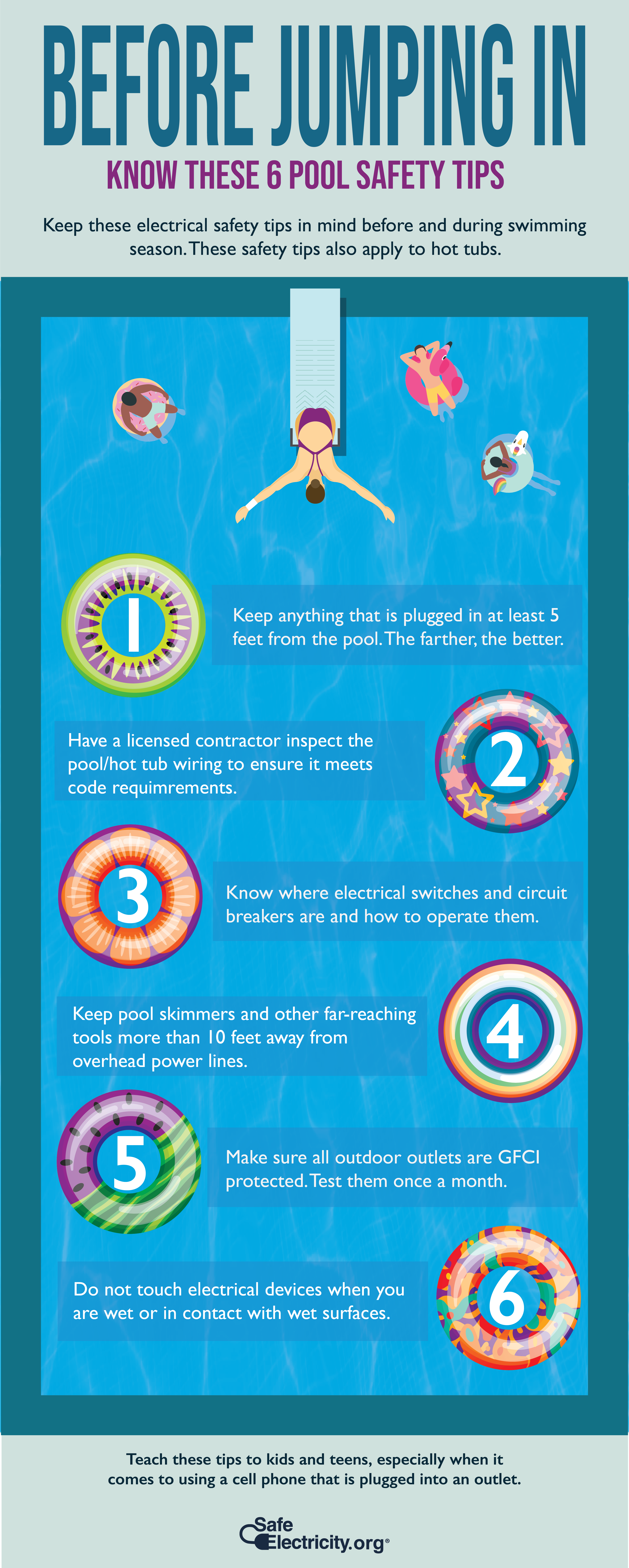Before You Jump In, Consider Potential Electrical Hazards
If you own a pool or hot tub, you know there are several steps required to keep it clean and well maintained. One aspect of owning a hot tub or pool that is often not top of mind for homeowners is the electrical system, which can pose a significant or even deadly hazard.
Since pool and hot tub areas mean wet skin and wet surfaces, the chance of electrocution increases when electricity is present.
The U.S. Consumer Product Safety Commission (CPSC) points out that electricity around pools, hot tubs and spas can be found in underwater lights, electric pool equipment (e.g., pumps, filters, vacuum), extension and power cords, electrical outlets or switches, electrical devices such as TVs and overhead power lines.
To keep swimmers and hot tubbers as safe as possible, be sure to have the electrical system inspected, repaired and upgraded to local and National Electrical Code by a licensed contractor. Also, do not set up a pool (temporary or permanent) where power lines are overhead or within 25 feet of water.

Electrical Water Safety Also Includes:
- Making sure ground-fault circuit interrupters (GFCIs) are installed:
- On underwater lighting circuits operating at 15 volts or more.
- On all electrical equipment, including 120- and 240-volt heaters close to the pool.
- On all outdoor receptacles (outlets) within 20 feet of the water’s edge.
- Testing permanently installed GFCIs monthly. Test those that are portable or connected to a cord before each use.
- Looking for signs of mold or other growth on the inside lenses of lights, which can indicate water leakage.
- Ensuring that the power switch and GFCI for underwater lights are clearly marked and easily accessible in an emergency.
- Labeling power switches for pool, hot tub and spa equipment, as well as lighting.
- Using battery-operated electronics whenever possible.
- Ensuring that hands and feet are dry while using electrical devices.
- Keeping long-handled tools and poles away from nearby power lines, including the drop-down lines to your home.
- Holding pool skimmers and other long-handled tools as low as possible to the ground.
- Keeping electrical cords, wires and devices out of reach and at least 5 feet from the water.
- Unplugging a device that has fallen into the water before touching it. Even submersible pumps designed to run under water may not be safe to use when someone is in the water.
What To Look For
Swimmers may feel a tingling sensation, experience muscle cramps or may not be able to move. You may see panic behavior by others or a motionless swimmer in the water. You might also see underwater lights that are not working properly. You might also hear complaints of tingling or other odd sensations.
If you think you are being shocked while in the water, move away from the source of the shock and get out of the water. If possible, exit without using a metal ladder; touching metal may increase the risk of shock.
If you think someone in the water is experiencing an electrical shock, immediately turn off all power. If the power is not turned off, rescuers can also be shocked or electrocuted. After the power is disconnected, call 9-1-1, or have someone else make the call.
Sources: CPSD and SafeElectricty.org
